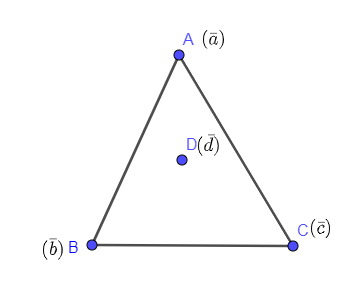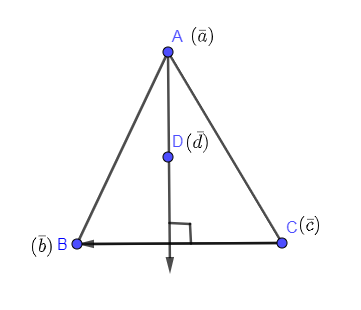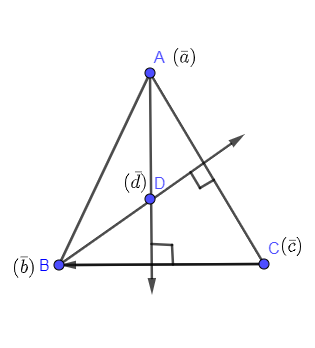Question
Question: Let \(\overline{a},\overline{b},\overline{c},\overline{d}\) be position vectors of four points A, B,...
Let a,b,c,d be position vectors of four points A, B, C and D lying in a plane. If (a−d).(b−c)=0=(b−d).(c−a) , then ΔABC has D as:
(a) in-centre
(b) circum-centre
(c) ortho-centre
(d) centroid
Solution
We know that if the dot product of two vectors is 0 this means that the two vectors are perpendicular to each other. And it is given that if ABC is a triangle then we are asked about the point D. As you can see that point D (or d) has occurred in both the dot products given in the above problem so the point D will lie inside the triangle ABC.
Complete step by step answer:
In the above problem, it is given that from the three position vectors with points A, B and C, a triangle has been constructed and the point D lies inside the circle.

Also, there is a relation between the vectors a,b,c,d which we are shown below:
(a−d).(b−c)=0=(b−d).(c−a)
We know that when the two vectors are perpendicular to each other then their dot product is 0 so the vectors (a−d)&(b−c) are perpendicular to each other. Also the vectors (b−d)&(c−a) are perpendicular to each other.
Now, we can write (a−d) as AD and (b−c) as BC and (b−d) as BD and (c−a) as CA. Drawing these vectors in the given triangle. Also, make sure that the vectors whose dot product is 0 are perpendicular to each other.

In the above problem we have drawn (a−d)&(b−c).
Now, drawing (b−d)&(c−a) we get,

We know that orthocenter is the point in the triangle which is the intersection of all the altitudes passing through three vertices of the triangle. This means point D is the orthocenter of the triangle.
So, the correct answer is “Option c”.
Note: In the above problem, we have learnt that when the dot product of two vectors is 0 then those two vectors are perpendicular to each other. Also, we have learnt that intersection of altitudes of the three vertices of a triangle is the orthocenter.
